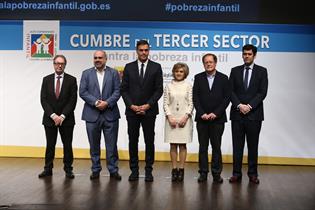Pedro Sánchez opens Third Sector Summit on child poverty
Government of Spain to build alliance to combat inequalities and child poverty
President's News - 2018.12.13
Images of the Third Sector Summit for the Fight against Childhood PovertyPool Moncloa/Diego del Monte 2018.12.13
Headquarters of CaixaForum, Madrid
In his speech, Pedro Sánchez said that "we cannot tolerate Spain's position among the countries with the highest at-risk-of-poverty rates among children in Europe", stressing that "our Welfare State has not been working effectively enough with regard to the protection of children" and that "this has to change". Pedro Sánchez announced that the Government is going to "invest in children" and, to that end, is working on the launch of an alliance between companies, non-profit organisations and public authorities, aimed at designing, promoting and implementing a wide range of initiatives to combat the inequalities affecting children in a situation of vulnerability.
Besides promoting projects that already exist, this initiative will design new programmes and foster their development among the various companies and organisations taking part. This coalition, which seeks to improve the future prospects of Spanish society, will act as a resource catalyst between public and private actors by implementing initiatives capable of enhancing the life opportunities of children who are born into and raised in disadvantaged environments.
The President of the Government said that efforts will be made to promote social mobility, equal opportunities and equal treatment, as well as non-discrimination, and underlined the "unavoidable" commitment from his government to "reducing and preventing child poverty". This commitment has been demonstrated since his government came to power with the creation of a High Commissioner for the Fight against Childhood Poverty and now the promotion of this alliance to combat social inequalities, an issue of "fundamental justice" in the opinion of Pedro Sánchez.
The President of the Government expressed gratitude to the companies and entities operating in the third sector, which gathered together on Thursday at the CaixaForum centre in Madrid, for their collaboration on ensuring that the work they do on the front line "serves as a guiding light and inspiration when designing public policies capable of guaranteeing children's rights". Pedro Sánchez described as "unavoidable" the need to open a channel for communication with those dealing with this issue on a day-to-day basis and offering a response to the people who are most in need.
Besides this alliance, the President of the Government said that his government intends to lead the actions aimed at creating a Children's Guarantee within the framework of the new European Social Fund Plus, an EU initiative that seeks to ensure the children living in a situation of vulnerability in Europe enjoy guaranteed access to fundamental rights, such as quality healthcare and education, protection, a decent home and proper nutrition, among others things.
Pedro Sánchez also recalled that the proposed 2019 Budget includes a heading that will allow the amount of transfers per dependent child for children in severe poverty to be doubled, as well as a heading for moving towards progressive funding for universal education at ages 0-3, along with an increase in funding for grants issued on socio-economic grounds. For that reason, said the President of the Government, "we are going to take our proposed budget to Parliament and fight for its approval".
Child poverty in Spain
 Pool Moncloa/Fernando CalvoSpain, one of the countries with the highest at-risk-of-poverty rates in Europe, had an at-risk-of-poverty rate among the under-18 of 29.7% in 2016. This is 9.7 points higher than the European average. Although the figure fell to 28.3% in 2017, these are still very high numbers.
Pool Moncloa/Fernando CalvoSpain, one of the countries with the highest at-risk-of-poverty rates in Europe, had an at-risk-of-poverty rate among the under-18 of 29.7% in 2016. This is 9.7 points higher than the European average. Although the figure fell to 28.3% in 2017, these are still very high numbers.
The Spanish households with the highest poverty rate are households with children, especially single-parent families and large families. The persistent poverty risk among the under-18 stood at 22.3% in the period 2012-2015, far higher than the rate seen in other age groups. The Welfare State in Spain is highly unequal in terms of its redistribution capacity. It is highly effective in terms of protecting against and reducing poverty in later life but does not work in terms of protecting children.
The event opened on Thursday by the President of the Government will be attended by more than 70 non-profit organisations, as well as the Minister for Health, Consumption and Social Well-being, María Luisa Carcedo, the Minister for Territorial Policy and the Civil Service, Meritxell Batet, and the High Commissioners for the Fight against Childhood Poverty, Pau Marí-Klose, and for the 2030 Agenda, Cristina Gallach.
Non official translation





